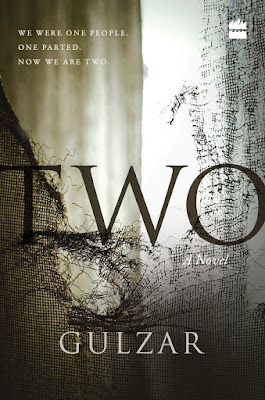Expectations are the bane of
mankind. From hermits that expect to attain salvation through penances to
lesser mortals trying to reap the benefits of hard work, we are all driven by
expectations of one kind or the other. No wonder then that we readers have our
own expectations too – to see every book that we read leave upon us a lasting
impression or a meaningful lesson. Especially if the book happens to be from
our favorite authors or on our favorite topics, our expectations soar high.
But, like most, a reader’s expectations too fail, at least once in a while.
'Two' is one such a disappointment. This being the work of Gulzar, a man with
the knack of conveying so much in so few words, I opened it with a lot of expectations,
but only to be disappointed.
Gulzar is one of those
innumerable victims of the India-Pakistan partition. Being a famous writer, he
has time and again recounted in his works the horrors of that blood-soaked
period of modern Indian history. Like many people who had their roots on either
side of the border ripped out, he too nurtures within his heart a desire to see
both countries get united. Or, at least, stop quibbling like 'school boys', to
borrow his words. He has always tried to heal the wounds of partition through
his poems and short stories. This time, he has attempted to do the same through
a new format - the novella.
This novella by Gulzar, details
the calm lives of the people of Campbellpur, in that part of the country that
was to become Pakistan, the chaos preceding partition, the turmoil that befell
them during partition and the horrors that awaited them even during the much
more civilized, modern, later days. A school teacher and his simple family, an
ageing courtesan, a rich landowner forced to abandon all his wealth,
truck-drivers, dhaba owners, men of narrow ideas and great ideals all form the
ensemble in this emotional work. Many of them leave 'Pakistan' by foot, while a
bunch of them leave by truck. But even after coming to the other side of the
border, they don't find solace. They remain refugees at an emotional level,
with memories of their ancestral land haunting them. Then there are the
conflicts that kept happening well within and outside their country of refuge -
India-Pakistan war, rise of Bangladesh, Kargil war on the outside, and the 1984
anti-Sikh pogroms on the inside. Thus, like 'the dry leaves falling from the
trees', they are left unhinged, thrown here and there at the whims of the
political winds.
The book is brilliant in parts,
be it the formation of characters, depiction of events or flow within chapters.
One can feel Gulzar's indignation and deep pain at the turn of events that
cleaved the great nation into two. But seen as a whole the book isn't what
you'd expect from someone like Gulzar. The book simply feels like a bunch of
emotional events melodramatically cobbled together, using the thread of
Partition. Of course, the book is said to be based upon real events, recounted
by the families that went through the pain of partition, but somehow, it
doesn't all stick together as a whole. May be, Gulzar was involved in this work
more as a victim, dealing with it more at an emotional level, than as an
author.
A nice, simple read, from an
author renowned for painting vivid pictures with his words. The book can also
serve as a reminder or as an introduction to that gory part of our collective
past. But as a work of literary quality, it simply doesn't count for much.
'Two' is a good book, but the
parts here simply don't add up to form a perfect whole!





No comments:
Post a Comment
Note: Only a member of this blog may post a comment.